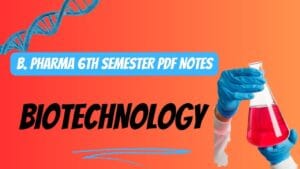Pharmaceutical Biotechnology – B. Pharma 6th Semester Notes Pdf

Scope:
Biotechnology has a long promise to revolutionize the biological sciences and technology.
Scientific application of biotechnology in the field of genetic engineering, medicine, and fermentation technology makes the subject interesting.
Biotechnology is leading to new biological revolutions in the diagnosis, prevention, and cure of diseases, and new and cheaper pharmaceutical drugs.
Biotechnology has already produced transgenic crops and animals and the future promises a lot more. It is basically a research-based subject.
Objectives: Upon completion of the subject student shall be able to;
1. Understanding the importance of Immobilized enzymes in Pharmaceutical Industries
2. Genetic engineering applications in relation to the production of pharmaceuticals
3. Importance of Monoclonal antibodies in Industries
4. Appreciate the use of microorganisms in fermentation technology
Pharmaceutical Biotechnology Unit-I
a) Brief introduction to Biotechnology with reference to Pharmaceutical Sciences.
b) Enzyme Biotechnology- Methods of enzyme immobilization and applications.
c) Biosensors- Working and applications of biosensors in Pharmaceutical Industries.
d) Brief introduction to Protein Engineering.
e) Use of microbes in industry. Production of Enzymes- General consideration – Amylase, Catalase, Peroxidase, Lipase, Protease, Penicillinase.
f) Basic principles of genetic engineering.
Pharmaceutical Biotechnology Unit-II
a) Study of cloning vectors, restriction endonucleases, and DNA ligase.
b) Recombinant DNA technology. Application of genetic engineering in medicine.
c) Application of r DNA technology and genetic engineering in the production of i) Interferon ii) Vaccines- hepatitis- B iii) Hormones-Insulin.
d) Brief introduction to PCR
Pharmaceutical Biotechnology Unit-III
Types of immunity- humoral immunity, cellular immunity
a) Structure of Immunoglobulins
b) Structure and Function of MHC
c) Hypersensitivity reactions, Immune stimulation, and Immune suppressions.
d) General method of the preparation of bacterial vaccines, toxoids, viral vaccines, antitoxins, serum-immune blood derivatives, and other products relative to immunity.
e) Storage conditions and stability of official vaccines
f) Hybridoma technology- Production, Purification, and Applications
g) Blood products and Plasma substitutes.
Pharmaceutical Biotechnology Unit-IV
a) Immuno blotting techniques- ELISA, Western blotting, Southern blotting.
b) Genetic organization of Eukaryotes and Prokaryotes
c) Microbial genetics including transformation, transduction, conjugation, plasmids, and transposons.
d) Introduction to Microbial biotransformation and applications.
e) Mutation: Types of mutation/mutants.
Pharmaceutical Biotechnology Unit-V
a) Fermentation methods and general requirements, the study of media, equipment, sterilization methods, aeration process, stirring.
b) Large-scale production fermenter design and its various controls.
c) Study of the production of – penicillins, citric acid, Vitamin B12, Glutamic acid, Griseofulvin,
d) Blood Products: Collection, Processing, and Storage of whole human blood, dried human plasma, plasma Substitutes.
Pharmaceutical Biotechnology Short Notes
Pharmaceutical biotechnology is a branch of biotechnology that focuses on the development and production of pharmaceutical drugs using biological processes. It combines the principles of biology and technology to design and manufacture drugs that are effective, safe, and tailored to specific medical needs.
Here are some key points about pharmaceutical biotechnology:
1. Genetic engineering: Pharmaceutical biotechnology heavily relies on genetic engineering techniques to manipulate and modify the genetic material of organisms. This enables scientists to produce therapeutic proteins, antibodies, and other bioactive molecules for pharmaceutical purposes.
2. Recombinant DNA technology: Recombinant DNA technology plays a vital role in pharmaceutical biotechnology. It involves the insertion of specific DNA sequences into host organisms, such as bacteria or yeast, to produce desired therapeutic proteins or enzymes.
3. Production of biopharmaceuticals: Pharmaceutical biotechnology has revolutionized the production of biopharmaceuticals, which are drugs derived from biological sources. These include protein-based drugs like insulin, growth hormones, and monoclonal antibodies. Biopharmaceuticals offer targeted therapies for various diseases, including cancer, autoimmune disorders, and genetic disorders.
4. Drug discovery and development: Pharmaceutical biotechnology is involved in the entire drug discovery and development process. It includes identifying potential drug targets, designing and screening drug candidates, conducting preclinical and clinical trials, and obtaining regulatory approvals.
5. Personalized medicine: One of the significant advancements in pharmaceutical biotechnology is the concept of personalized medicine. This approach aims to develop treatments that are tailored to an individual’s genetic makeup, lifestyle, and disease characteristics. It allows for more precise and effective therapies, minimizing adverse effects and improving patient outcomes.
6. Vaccine development: Pharmaceutical biotechnology has played a crucial role in the development of vaccines. Recombinant DNA technology has enabled the production of safe and effective vaccines against various infectious diseases, including hepatitis B, human papillomavirus (HPV), and COVID-19.
7. Bioprocessing and biomanufacturing: Pharmaceutical biotechnology involves the use of bioprocessing techniques for large-scale production of biopharmaceuticals. This includes fermentation, purification, and formulation processes to ensure product quality, safety, and efficacy.
8. Regulatory considerations: Due to the complex nature of biopharmaceuticals, regulatory bodies have established specific guidelines and requirements for their approval and commercialization. Pharmaceutical biotechnology companies must adhere to these regulations to ensure the safety and effectiveness of their products.
Overall, pharmaceutical biotechnology has revolutionized the pharmaceutical industry by harnessing the power of biology and technology to develop innovative and targeted therapies. It continues to drive advancements in drug discovery, personalized medicine, and the treatment of various diseases, ultimately improving patient care and outcomes.
Pharmaceutical biotechnology Recommended Books (Latest edition):
1. B.R. Glick and J.J. Pasternak: Molecular Biotechnology: Principles and Applications of recombinant DNA: ASM Press Washington D.C.
2. RA Goldshy et. al., : Kuby Immunology.
3. J.W. Goding: Monoclonal Antibodies.
4. J.M. Walker and E.B. Gingold: Molecular Biology and Biotechnology by Royal Society of Chemistry.
5. Zaborsky: Immobilized Enzymes, CRC Press, Degraland, Ohio.
6. S.B. Primrose: Molecular Biotechnology (Second Edition) Blackwell Scientific Publication.
7. Stanbury F., P., Whitakar A., and Hall J., S., Principles of fermentation technology, 2nd edition, Aditya books Ltd., New Delhi

Comments are closed.